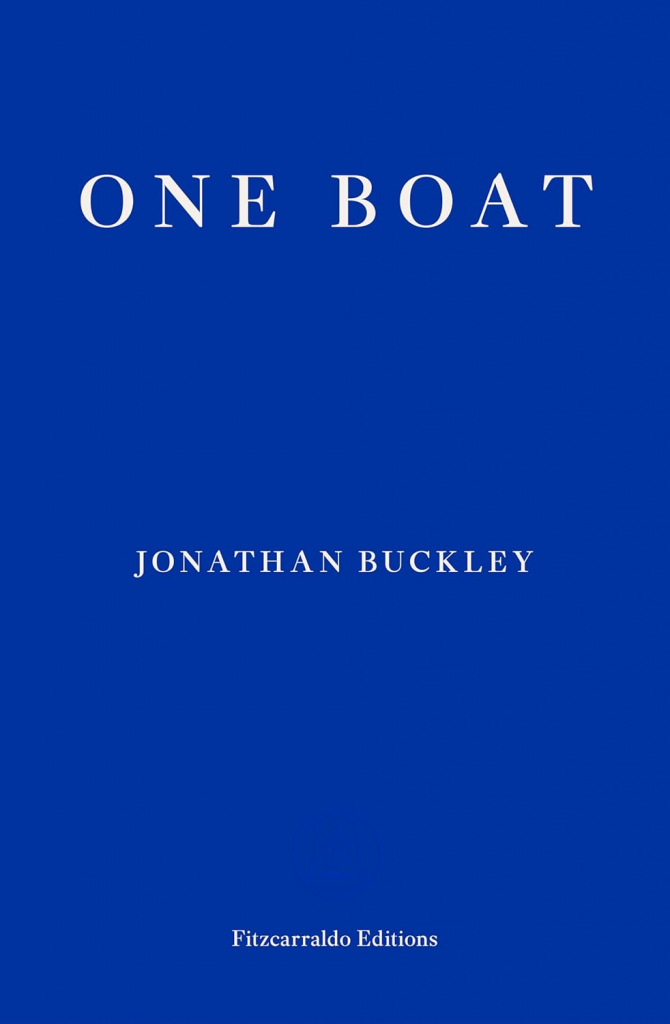It’s a shame, in a way, that I succumbed to the temptation to read this so early in my journey through the Booker longlist. Because I doubt very much that the longlist has anything better to offer me. I doubt I’ll read anything better for the rest of the year.
Jonathan Buckley’s slim novel – poised, elegant, restrained, every word chosen and placed with knowledge and intent – embodies the Platonic ideal of good writing. One Boat also demonstrates the far extremes to which the ‘mystery novel’ template may be stretched, and yet still be successful in promoting a state of enchantment.
A wide river, smooth, with long flights of bright stone steps on both banks, and people processing down to the water. Overhead, large low-flying & slow-flying birds, one per person, as if each person has a designated escort. At the river’s edge, the people do not pause. They walk down the steps, which extend a long way into the water, and when the people are in the water they continue to descend, untroubled. I take my place in the procession.
Nine years after the death of her mother, a woman returns to a seaside town in Greece to mourn the loss of her father. Teresa, who works in contract law, claims not to be a writer but makes notes constantly: her impressions of the town and how it has changed, the people she meets (and has met before), even her dreams. On her previous visit, she had recently separated from her husband, Tom, a split that brings back memories of her own parents’ divorce, to which it bears similarities. Nine years later, Teresa’s memories of Tom have taken on a more abstract quality, and it is the town itself – and a story she was told when she was there before – that preys on her mind and may even be having an impact on her future.
Some days, he told me, he argued with himself, making the very same points that I had made, ‘if not so eloquently’, but reasonableness could never prevail. The fire is never completely extinguished. He had come to think that people never change their minds because they’ve been persuaded to. If they change their minds, it’s because they want to. The door only opens if it’s already unlocked… He smiled as he shook my hand, but his eyes, I noted later, made me think of a man going into exile – to his execution, even.
Though it is a fraction of its length, the book that kept coming to mind as I read One Boat was John Fowles’s The Magus. The Greek setting, of course, but more than that – the nature of mortality and the aftershocks of violence, the sense of a deeper mystery buried. Of a clear-eyed narrator from whom truths remain hidden, of histories that turn on the result of a single decision. Buckley reveals how much of the art of the mystery lies in making a virtue of the unresolved, of the unresolvable. Of the art of fiction itself, and how it is finally inextricable from the conflicted, exterior fact of the writer’s life.
If you like Chris Priest’s novel The Glamour, you will like this. If you like Alain Resnais’s film Last Year in Marienbad, you will like this, too.
There will be a particular tranche of readers who will rise up in opposition to the final chapter, complaining about having the rug pulled, about being ‘thrown out of the narrative’. This book was not written for you, it was written for me.
With his previous – and equally brilliant – novel Tell shortlisted for last year’s Goldsmiths Prize, it is wonderful to see Jonathan Buckley finally getting some of the recognition he has long deserved.
Could it be a contender?
What was it John Banville said the year he won? It would be nice to see a work of art winning the Booker Prize. Going by the current state of things, it’ll probably not make the shortlist…
